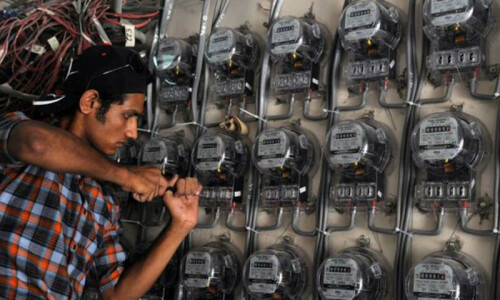ISLAMABAD: To raise an additional Rs. 28 billion and pay off a nine-month backlog, Karachi-based K-Electric has requested permission to charge power consumers up to Rs. 18.6 per unit in fuel costs, with an average monthly burden of roughly Rs. 2 per unit.
To clear the backlog and prevent a sudden increase in its customers’ burden, the KE offered three distinct possibilities for increased fuel cost recovery from consumers on a “provisional basis” in a series of petitions submitted to the National Electric Power Regulatory Authority (Nepra).
In response to the KE’s appeal for provisional monthly fuel costs adjustments (FCA) for the months of July 2023 through March 2024, Nepra has scheduled a public hearing on May 9. In order to facilitate timely cost recovery and prevent further accumulation of adjustments to be recovered from customers, the KE explained that, since its multi-year tariff (2024–30) is currently being considered by regulators, it has filed FCAs based on three scenarios. The request is for the approval of any one of the three scenarios and to serve as a guide for the recovery mechanism for the next nine months.
In the first case, the KE has suggested that the FCA be determined using the existing interim rate as a reference and the difference between the real and monthly fuel costs. With a net higher revenue of almost Rs19 billion, the KE requested a rate rise for seven months and a rate decrease for two months under this option. Over a period of nine months, the total net impact comes to around Rs13 per unit, or an average of Rs1.45 per unit every month.
There will be no higher FCA for “lifeline consumers.”
Under the terms of the tariff petition it filed and which is presently being considered by Nepra, the KE requested permission to charge consumers the difference between the actual and reference monthly fuel costs in the second option. In this instance, in order to raise approximately Rs28 billion, the utility has also requested a seven-month rise in fuel costs and a two-month reduction in fuel costs. The net cumulative increased fuel cost is Rs18.6 per unit at a monthly average of Rs2.06 per unit for nine months.
In the third scenario, the KE suggested that the difference between annual weighted average fuel reference costs and actual fuel costs be taken into account in accordance with the tariff petition that the KE filed and is presently reviewing by Nepra. The utility also requested a seven-month increase in fuel costs and a two-month decrease in fuel costs in this instance. With a monthly average of roughly Rs1.90 per unit, the net total impact comes out to be Rs16.9 per unit, translating into a financial impact of roughly Rs24 billion.
Customers of former distribution businesses (Discos) have previously covered these extra gasoline expenses, which vary from Rs3 to Rs7.5 per unit each month.
Nepra will also establish the procedure and timeline for recovering the increase in FCAs once approval. The FCA is often only applied to the consumer’s bills for a single month and is reviewed monthly in accordance with the tariff regime that is in effect throughout the nation. Due to its delayed tariff applications and regulatory clearances on a monthly, quarterly, and annual basis, the KE does, however, have a backlog.
Upon authorized, the increased FCA would be applied to all consumer categories with the exception of those who rely on lifeline power, protected domestic consumers who use up to 300 units, agricultural consumers, and EV charging stations. Regardless of consumption level, domestic customers with Time of Use (ToU) meters are likewise subject to the modification on account of monthly FCA.
Under the tariff mechanism, changes in fuel prices are only passed on to customers on a monthly basis through an automatic mechanism. In contrast, the federal government builds base tariff adjustments into the tariff mechanism on a quarterly basis to account for variations in power purchase price, capacity charges, variable operation and maintenance costs, use of system charges, and the impact of transmission and distribution losses.








